































Credit cards are a great way to earn a return on many different kinds of spending. However, there are a ton of cards to choose from, and some are definitely better than others. Like any craftsperson will tell you, there's a tool for every occasion, and credit cards are no different.
Here are the best credit cards for consumers to choose among.
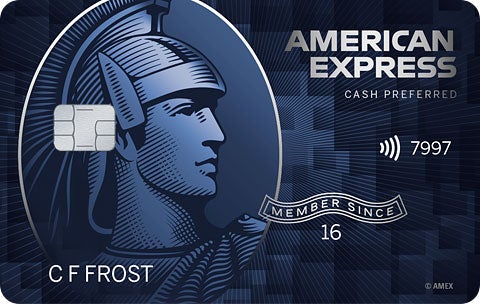 card highlights intro bonusEarna$250 statement credit after you spend$3,000 in purchases on your new Card within the first 6 months.APR19.24% - 29.99% Variablerecommended creditExcellent/Goodreward rates
card highlights intro bonusEarna$250 statement credit after you spend$3,000 in purchases on your new Card within the first 6 months.APR19.24% - 29.99% Variablerecommended creditExcellent/Goodreward rates The Blue Cash Preferred is truly one of the best credit cards for everyday spending. It covers gas, groceries, streaming, and transit. And while it does have an annual fee of$95 ($0 intro annual fee for the first year), its cash back rate for groceries is so strong that most consumers (myself included) will hardly notice the fee.
Spend as little as$1,600 on groceries per year to earn$96, which is enough to cover its ongoing annual fee. But cardholders will earn much more than that after accounting for the card's gas and streaming rewards.
Also, while the card is restricted to earning 6% cash back at U.S. supermarkets (excluding Walmart, Target, and Costco) an easy work around is to purchase gift cards for other retailers at the grocery store. That way, you can earn that high 6% cash back rate with more than just grocery stores.
With the cost of everyday goods on the rise, having a credit card that earns a strong rate for both gas and groceries, as well as for something that can help consumers relax a bit (i.e. streaming services), could go a long way.
Curious to see how it stacks up to the competition? Check out our choices for the 5 best grocery credit cards.
Pros
Cons

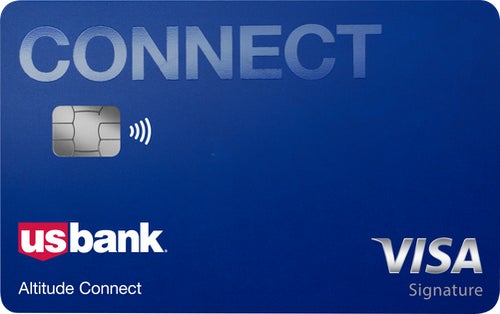 card highlights intro bonusIntro Offer: Earn 50,000 bonus points when you spend$2,000 in eligible purchases within the first 120 days of account opening.APR21.24% - 29.24% (Variable)recommended creditExcellentreward rates
card highlights intro bonusIntro Offer: Earn 50,000 bonus points when you spend$2,000 in eligible purchases within the first 120 days of account opening.APR21.24% - 29.24% (Variable)recommended creditExcellentreward rates With gas prices on the rise across the country, earning a return on gas spending is more important than ever. Although it does have a$95 annual fee, it's waived for the first year.
Each point is worth 1 cent and can be redeemed for statement credits, which means the card essentially earns 4% cash back at gas stations. So, if you spend$2,500 annually on gas, you'll earn$100 back, which covers the fee.
While that might seem steep, with record-breaking gas prices, it wouldn't be surprising to see even higher levels of annual spending. For example, according to Yardeni Research, a US household could spend more than$5,000 on gas in 2022. Spending$5,000 in gas with the US Bank card would equate to$200 back.
In addition to strong gas rewards, the card earns a good rate for hotels and rental cars, groceries, dining, and streaming, so it's more than just a one-trick pony. It's issued as a Visa Signature, too, which means it comes equipped with a nice selection of useful perks, as well as an annual$30 streaming credit to cover some of your binge-watching needs.
Pros
Cons

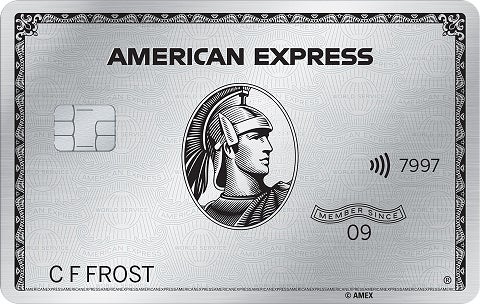 card highlights intro bonusEarn 80,000 Membership Rewards? Points after you spend$8,000 on purchases on your new Card in your first 6 months of Card Membership.APRSee Pay Over Time APRrecommended creditExcellent/Goodreward rates
card highlights intro bonusEarn 80,000 Membership Rewards? Points after you spend$8,000 on purchases on your new Card in your first 6 months of Card Membership.APRSee Pay Over Time APRrecommended creditExcellent/Goodreward rates It's hard not to think of The Platinum Card from American Express when considering the best travel cards. Few credit cards can compete with its nearly unparalleled benefit offering. However, it should only be considered by the avid traveler, as it has an annual fee of$695.
That said, it also comes equipped with a staggering number of annual credits that effectively lower the annual fee to a much more manageable number. That's another reason why it shouldn't be considered by the average traveler; you'll only get the true value from the card so long as you're able to take advantage of everything it has to offer.
While the card does have good travel rewards, the true draw are its benefits. In addition to a vast array of travel protections, including *Travel Accident Insurance, *rental car insurance, *baggage insurance, and *trip delay insurance, The Platinum Card has several annual credits, including up to a$200 hotel credit, up to a$200 incidental airline fee credit, up to a$189 CLEAR? Plus credit, up to a$240 digital entertainment credit, a$155 Walmart+ credit, and a Global Entry/TSA PreCheck application fee credit, to name a few.
If you can utilize those credits each year, it would more than cover the annual fee. There's also the complimentary Elite statuses it offers with Hilton and Marriott Bonvoy, plus access to the largest collection of airport lounges through the Global Lounge Collection membership. Suffice to say, there is plenty of value to be had here for the frequent traveler.
Pros
Cons
*Eligibility and Benefit level varies by Card. Terms, Conditions, and Limitations Apply. Please visit americanexpress.com/benefitsguide for more details. Underwritten by Amex Assurance Company.
Terms apply to American Express benefits and offers. Enrollment may be required for select American Express benefits and offers. Visit americanexpress.com to learn more.
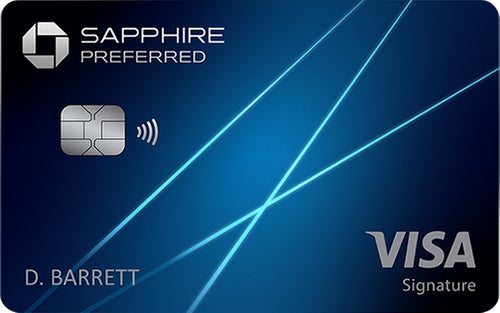 card highlights intro bonusEarn 60,000 bonus points after you spend$4,000 on purchases in the first 3 months from account opening. That's$750 when you redeem through Chase Ultimate Rewards?.APR21.49% - 28.49% Variablerecommended creditExcellent/Goodreward rates
card highlights intro bonusEarn 60,000 bonus points after you spend$4,000 on purchases in the first 3 months from account opening. That's$750 when you redeem through Chase Ultimate Rewards?.APR21.49% - 28.49% Variablerecommended creditExcellent/Goodreward rates With its high welcome bonus, flexible redemption options, and lucrative rewards program, it's easy to see why this is a good choice for a rewards card. While it is geared toward travel, cardholders will no doubt see a good return on their spending after taking full advantage of what it has to offer.
Its primary features are its 1:1 transfer rate to Chase's travel partners and 25% redemption bonus when redeeming rewards for travel through Chase Ultimate Rewards. Each point is typically worth 1 cent, but if you redeem through Chase Ultimate Rewards, that'll be bumped up to 1.25 cents. However, if you transfer your points to one of Chase's travel partners, you can find an even higher per-point value.
If you can find the right transfer deal, Chase Ultimate Rewards points could be worth 1.5 cents or more each. With its 5x points for travel booked through Chase Ultimate Rewards, 3x points for dining and streaming, and 2x points for all other travel, that would mean the card earns the equivalent of 7.5%, 4.5%, and 3% cash back for those categories, respectively. Chase's travel partners include JetBlue, United, Southwest, World of Hyatt, and Marriott Bonvoy, among others.
Want to see how it compares to the competition? Take a look at our 6 best rewards credit cards.
Pros
Cons

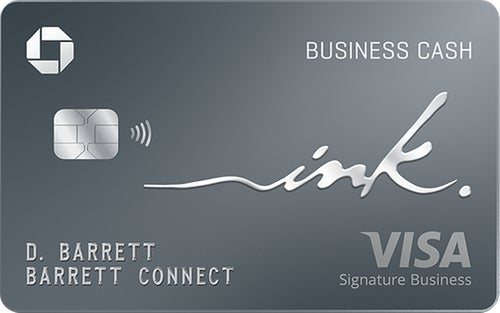 card highlights intro bonusEarn $900 bonus cash back after you spend$6,000 on purchases in the first 3 months from account openingAPR18.49% - 24.49% Variablerecommended creditGood, Excellentreward rates
card highlights intro bonusEarn $900 bonus cash back after you spend$6,000 on purchases in the first 3 months from account openingAPR18.49% - 24.49% Variablerecommended creditGood, Excellentreward rates If you're a small business owner who's looking for a way to earn a return on a few business-related expenses, consider this card. It earns 5% cash back for popular business categories, including office supplies, internet, and cable and phone services. It also has a lucrative welcome bonus and offers rewards on gas and dining.
It's a good option for a business that spends across a number of different categories. It's simple and rewarding, and even comes with an intro 0% APR offer for new purchases (then 18.24% to 24.24% variable). Additionally, it features free employee cards and a nice selection of travel and shopping protections.
Looking for other options? Check out our 6 best credit cards for business owners.
Pros
Cons

While all of the cards collected here are great options, the best overall credit card for consumers is the Blue Cash Preferred from American Express. It's incredibly rewarding and covers essential purchases like gas and groceries. It does carry an annual fee, but you'll hardly notice it thanks to its high cash back rate. It might not have the most impressive collection of benefits, but the cash back rate for necessary purchases is too good to pass up.
Considering that the cost of gas and food is increasing, having a card that can put some money back into your pocket for purchases you need to make regardless of the price is very valuable. And with a little extra work, you can earn 5% cash back at your favorite retailers simply by purchasing gift cards from your local grocery store.
It's benefits, while not as impressive as The Platinum Card, will still prove useful for cardholders. Your new purchases will be covered against damage and theft for 90 days, you can keep an eye on your VantageScore 3.0 credit score, plus take advantage of free two-day shipping with qualifying merchants thanks to the card's ShopRunner membership.
However, if you're still not sold, coming in second would be the Chase Sapphire Preferred. It's a lucrative card with tons to offer, but it takes some work to get the best value and is primarily travel focused, which makes it less accessible to the average consumer.
No matter which card you choose, however, you'll find a good deal of value and utility. Take a look at all of the best credit cards, side-by-side, and choose the one that would best suit your needs.
Card Name | Best for | Rewards |
Blue Cash Preferred | Essential spending |
|
US Bank Altitude Connect | Gas |
|
The Platinum Card from Amex | Travel |
|
Chase Sapphire Preferred | Rewards |
|
Chase Ink Business Cash | Business |
|
Each of these credit cards has plenty to offer, and using one or more for its particular advantages could maximize the return on your spending. For example, use the Blue Cash Preferred for all of your grocery shopping and the Chase Sapphire Preferred as your go-to rewards card. The US Bank Altitude Connect would be better for gas, and the Ink Business Cash is a great choice for business owners.
Get this card... | If you are... |
The Blue Cash Preferred | Looking to earn a ton of cash back for groceries, streaming, and gas |
US Bank Altitude Connect | Looking to earn rewards for filling up your gas tank |
The Platinum Card from Amex | Looking for premium travel benefits and rewards |
Chase Sapphire Preferred | Looking to earn rewards and plan to use them to fund your travels |
Chase Ink Business Cash | A business owner who wants to earn cash back for business expenses |
We chose these credit cards because they offer best-in-class rewards and benefits for their respective categories. The credit cards for each category were compared based on their rewards, benefits, redemption versatility, rates, fees, and intro APR offers.
The ones that made it to the top did so because they are widely recognized as strong credit cards that would make a welcomed addition to any consumer's wallet. Choose the card that best fits your spending habits and be sure to use it responsibly.
The simple answer is yes. However, the number of credit cards consumers should apply for varies. In general, it's a good idea to limit yourself to a rewards card for essential purchases such as gas and groceries, a travel card depending on how often you find yourself on the road, and a rewards card (such as a flat-rate cash back card) that earns rewards for purchases not covered by the other rewards card. Anything beyond three credit cards should be considered with greater caution.
You can use some of the cards here together. The Blue Cash Preferred is great for groceries, and combined with the US Bank Altitude Connect, you'd have both gas and groceries covered by strong rewards. You could then choose either the Sapphire Preferred for a general travel card, or The Platinum Card if you travel enough to justify the cost.
With all financial products, what's important is using the tools responsibly and being aware of the terms and fees. Pay your bill on time, avoid spending money you don't have, and don't change your spending habits to fit a card. You want the credit card to work for you, not the other way around.
Technically speaking, yes. However, it's not a good idea, both from a credit standpoint and a utility standpoint for the cards. Some of the credit cards overlap in rewards and features, like the Chase Sapphire Preferred and The Platinum Card, as well as carry relatively high annual fees.
If you're not enticed by any of the cards listed here, there are plenty of other credit cards available to choose from. Take a look at all of our best lists to find the credit card that would work well for you.
Rewards:
By issuer:
Travel:
Business:
Student:
Cryptocurrency:
Balance transfers/low interest:
Limited/bad credit:
Good credit:
Home improvement:
Credit unions:
Debit cards:
Opinions expressed here are author's alone, not those of any bank, credit card issuer, hotel, airline, or other entity. This content has not been reviewed, approved or otherwise endorsed by any of the entities included within the post.?
 Tags chauds:
Notre processus
finances
Cartes de crédit
Tags chauds:
Notre processus
finances
Cartes de crédit